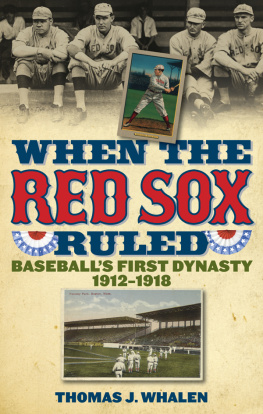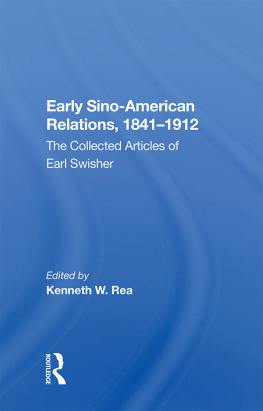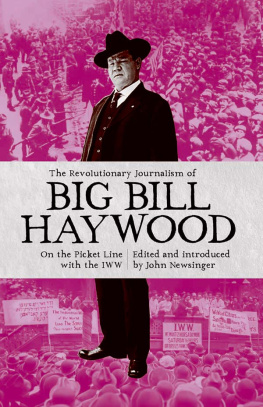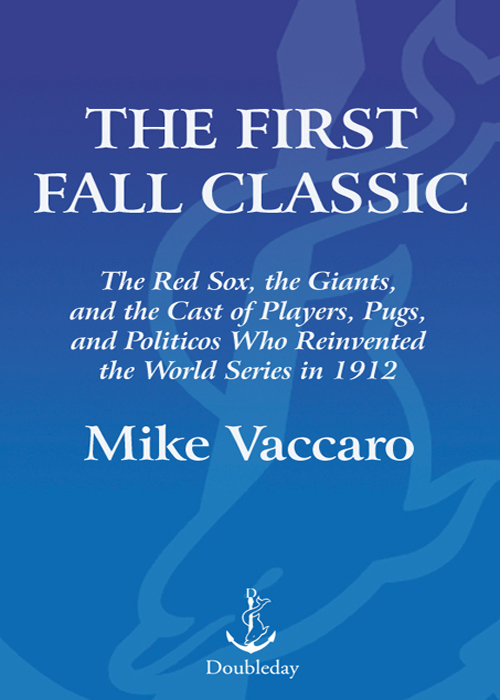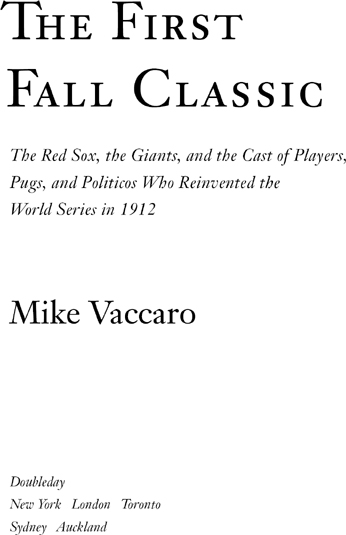Most of this bookperhaps 80 percent, perhaps moreis the product of reading contemporary news accounts of all the newspapers and periodicals listed in the Acknowledgments section, covering the prime events detailed in this book: the Becker Trial, the presidential campaign of 1912, the assassination attempt of Theodore Roosevelt, and, of course, the 1912 World Series.
Where matters of fact were concernedthe who, the what, the where, why, and howI made certain that there were at least two sources that concurred. In order to err on the side of accuracy, I omitted all instances where there were differing accounts of basic facts. As for quotes: Everything outside of conversations between characters that appears between quotation marks in this book appeared previously either in one of the cited newspapers or periodicals or in the research materials provided by the National Baseball Hall of Fame Museum. The sole liberties taken involved re-creating conversations that were referred to outside of quotations by the principals involved in those conversations; these I tried to reconstruct as faithfully as possible, given the knowledge gleaned from studying their characters and personalities over the course of fourteen months of research.
I am confident that having applied these standards to every sentence, everything contained in this book is factual and faithful; any errors that do appear are mine and mine alone to answer for.
I NTRODUCTION
B OSTON The muckerishness of the fan is exceeding itself in muck this Fall. Boston howled that it was all fixed, then raved over their team when it won. New York screamed that the Giants were throwing the series. After every game in New York and Boston we were compelled to listen to wild yarns of drinking and dissipation. Such persons really arent worth answering, but to them one can only say: If they will invent some system by which baseball games can be made crooked without being detected in two innings they can make fortunes
H UGH S. F ULLERTON , C HICAGO D AILY T RIBUNE ,
O CTOBER 20, 1912
T HE FIRST TIME you see that sign, David Wright said, it scares the crap out of you, especially if you know a little bit about history.
Wright, the third baseman for the New York Mets, was sitting in front of his locker at Shea Stadium in the spring of 2008, pointing over to where the words of Rule Twenty-one were posted on a far wall of the home teams dressing room. In one form or another, the same words have appeared in every clubhouse in every major-league baseball stadium since 1927, when Rule Twenty-one was officially adopted at the urging of Kenesaw Mountain Landis, the first commissioner of baseball, a man hired in the wake of the most infamous gambling scandal in the history of professional American sport. From the moment a baseball player signs his first pro contract, these wordsand the spirit of the wordsare drilled, and instilled, and grilled, in a place of permanence and prominence deep within their souls:
Any player, umpire, or club or league official or employee, who shall bet any sum whatsoever upon any baseball game in connection with which the bettor has not duty to perform, shall be declared ineligible for one year. Any player, umpire, or club or league official or employee, who shall bet any sum whatsoever upon any baseball game in connection with which the bettor has a duty to perform shall be declared permanently ineligible.
Its hard to conceive of a world in which that kind of stuff is even possible, Wright said, before nodding at another sign listing another set of crimes and consequences. Now that, I guess, seems more relevant to me.
He was pointing at a new set of regulations freshly introduced to baseball clubhouses in recent years, detailing the punishment schedule for any player found using performance-enhancing drugs. For most of its latter history, baseball had turned a blind eye to steroids, HGH, amphetamines, and every other manner of illegal or illicit pharmaceutical (since 2002, it has tried to first minimize and now eliminate entirely steroids scourge from its landscape, a slow and painstaking process). In its own way, that mirrored how, for most of its earlier history, baseball had turned a deaf ear and a blind eye to the gamblers, bookmakers, shylocks, and fixers who crowded its grandstands.
Wright shook his head, smiled. The average baseball salary in 2008 was $2 million, meaning ballplayers werent quite the easy marks they were a century earlier, when many of them barely made $4,000 a year. The bookmakers who resided in the games shadows at the turn of the last century had been replaced by steroid suppliers at the dawn of the new one.
I guess every generation has its temptations, he said.
Speaking in a different century, inside a different New York City ballpark, describing in many ways an entirely different game, John J. McGraw held court before a small group of New York City newspapermen on the eve of the 1912 World Series, sitting in a dugout at the Polo Grounds, watching his baseball team take batting practice.
I dont worry about my boys, said McGraw, manager of the National Leaguechampion New York Giants, and I wouldnt worry about any group of baseball players good enough to win the pennant in their league. You have to be good at the game, and very skilled, thats true. But youd also better be of sound mind and character. If you are, then nothing else matters. Certainly not something as simple as money.
Then McGraw, whose scatology was legendary in those early years of the twentieth century, smiled, spit a stream of tobacco, and summarized his sentiments in a sentence that made the sportswriters smile.
Any son of a bitch can make money, he said. But it takes a special son of a bitch to be a worlds champion.
Such was the way baseball conducted its business and policed its players in those times that are often described either as simpler or more innocent; times, we have long been told, when men were men and they played for the love of the game, before the sport was polluted by money and greed and the corrupting peripheral influences endemic to them. True students of baseball have long had a word for that fable: Nonsense.
McGraw, were he so inclined, might have chosen a different word.
Bullshit, for instance.
In 1912, when ballplayers played for as little as $1,500 a year and as much as $15,000 a year, they endorsed everything from cigarettes to smokeless tobacco to shoes to whiskey to automobiles and everything else available to consumers flush with disposable income in a relatively prosperous time. They authored books, published newspaper columns, lent their surnames to dram shops and eateries of both high repute and low esteem. They made, on average, anywhere between 5 percent and 200 percent more than the average American worker, traveled in first-class accommodations, lodged at the best hotels, ate gourmet meals mostly on the arm, and if they knew which saloons to visit they could drink to their livers content without ever once blowing dust off their billfold.



